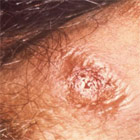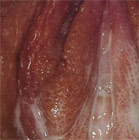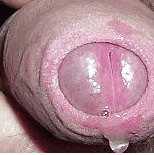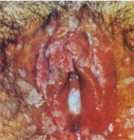The least sexy article you'll read today
You knew it was coming: it's time for the dreaded STI article.
You're beat over the head with it in virtually every article about sex: use protection or face the consequences. "Consequences" is kind of a vague term, though, especially when paired with cutesy cartoons of viruses that look like Tamagotchi pets.
There's nothing cute about sexually transmitted infections. That's why I turned off Google SafeSearch, gritted my teeth and struggled to keep my breakfast down, just so I could warn you about the puss-filled, oozy reality of STIs.

Genital Herpes
(From http://www.cureforherpes.org/)
There are two types of the herpes virus: type one usually causes cold sores, while type two causes sores on the genitals. However, it is possible to have type one herpes on the genitals, or type two herpes in the mouth — especially if you engage in oral sex. Since you can catch herpes by coming in direct contact with a sore, condoms are not entirely effective against the disease, as some of the infected areas may not be covered.
Symptoms:
Symptoms generally appear three to 12 days after being infected.
Herpes manifests itself differently from person to person. Generally, herpes will first show up as small blisters, which eventually form small, painful ulcers that dry out, leaving a scab. The ulcers can last two to four weeks, and eventually heal. Men and women infected with herpes may see sores on their genitals, anus, buttocks, thighs and mouth.
Treatment:
Herpes is called "the gift that keeps giving" for a reason — there is no cure that will eliminate herpes completely. Herpes manifests itself most painfully during the first episode, after which the virus remains dormant, only to flare up again later. Some medications can shorten each episode and decrease the pain, but the medication must be taken as soon as the symptoms appear.

Syphilis
From http://www.avert.org/syphilis.htm)
Syphilis is a bacterial infection that develops in three stages. If left untreated, syphilis can be fatal. Syphilis is transmitted through direct contact with a sore during vaginal, anal or oral intercourse. Condoms provide excellent protection against syphilis, but are not 100 per cent effective.
Symptoms:
Syphilis sores can appear 10 days to three months after exposure. The average is three weeks.
During the first stage of the disease, a firm red sore appears on the vagina, anus, penis or mouth. Some people may have multiple sores or swollen glands during this stage. Syphilis is highly contagious during this stage, but you may not know you are infected with it, as the sores may appear in a hard-to-see spot. Sores disappear after a few weeks, but this does not mean the syphilis is gone. If left untreated, the disease will worsen.
The second stage of the disease causes a rash, usually on the soles of the feet and the palms of the hands. It can also cause flu-like symptoms, including a fever and achiness. Many people in the secondary stage of syphilis exhibit no symptoms. The disease is still contagious during this stage.
Without treatment, syphilis progresses to the latent stage. This is a period when there are no signs of the disease, but the person is still infected. This stage can last for years.
During late-stage (tertiary) syphilis, the disease spreads all over the body, and can affect the brain, eyes, heart, spinal cord and bones. In late-stage syphilis, infected people may have difficulty walking, numbness and gradual blindness. The damage caused by syphilis cannot be treated. It is possible to die from syphilis.
Treatment:
In its early stages, syphilis is easily treated with antibiotics. A person who has been infected for a long time will need a longer treatment period. Treatment in late-stage syphilis can prevent further damage to the body.

Gonorrhea
(From http://dr-lokku.com/docblog/2009/11/22/gonorrhea/)
Also known as "The Clap", gonorrhea is definitely no cause for applause. It can cause an infection of the cervix in women, and an infection of the throat, urethra and anus of either sex. Condom use is very effective in preventing a gonorrhea infection.
Symptoms:
Symptoms appear three to five days after infection, though in many cases, gonorrhea has no symptoms.
Women may experience a change in vaginal discharge, lower abdominal pain, bleeding between periods and bleeding after sex. Men may experience penile discharge and sore, swollen testicles. Some people may experience a burning sensation during urination.
If left untreated, gonorrhea can cause severe problems, including sterility.
Treatment:
Gonorrhea is treated with antibiotics taken by mouth or injection.

Chlamydia
(From http://www.got-chlamydia.info/Chlamydia%20pictures.html)
Chlamydia is a bacterial infection that spreads through sexual intercourse or oral-genital contact. Touching an infected person's bodily fluids and then touching a mucous membrane (such as your eye) can lead to an infection. Condom use is highly effective in preventing Chlamydia transmission.
Symptoms:
Symptoms may take up to three weeks to appear, though there are no symptoms in about half of all cases of Chlamydia.
Women with Chlamydia may experience a change in vaginal discharge, lower abdominal pain, fever and chills, painful sexual intercourse or bleeding between periods or after sex. Men may experience penile discharge, an itchy feeling inside the penis or sore, swollen testicles. Both sexes may experience a burning sensation during urination.
If left untreated, Chlamydia can cause severe problems, including infertility in women or an infection in men's testicles.
Treatment:
Chlamydia is treated with oral antibiotics that take seven to 10 days to clear the infection.

Trichomonas
(From http://ismailskep.wordpress.com/2008/11/07/trichomonas-vaginalis/)
Trichomonas is a common parasite that can cause an infection of the genitals in both men and women. It is not exclusively transmitted sexually, and it can survive for hours on moist environments like bathing suits, towels and skin. Condoms are an effective way to prevent coming in contact with the trichomonas parasite.
Symptoms:
Symptoms usually appear 5 to 28 days after exposure.
In women, trichomonas can cause inflammation of the mucous membrane or lining of the vagina (vaginitis), strong-smelling yellowish green discharge, redness and itching around the vulva, difficulty urinating and painful sexual intercourse.
Men can carry the parasites without showing symptoms. Some symptoms in men include frothy penile discharge, redness and swelling around the tip of the penis and difficulty urinating.
Treatment:
Trichomonas is completely curable, and has no serious long-term effects. Doctors generally prescribe antibiotics and abstinence from sex until symptoms disappear.
AIDS
(From http://nursingcrib.com/communicable-diseases/aids-hiv/)
Human Immunodeficiency Virus, more commonly known as HIV, attacks and weakens the immune system. This makes an infected person vulnerable to all kinds of infection and disease. In rare case, people can carry HIV for years without getting sick. The vast majority of people infected with HIV will eventually develop a disease called Acquired Immunodeficiency Syndrome — AIDS.
HIV is transmitted through blood, sperm, vaginal and anal secretions, and can be transmitted through oral, vaginal or anal sex. HIV cannot be transmitted through saliva, tears, water, air, food or everyday activities. Condom use is very effective in protecting against an HIV infection.
Symptoms:
Symptoms, if any, will appear from one to three months after being infected. The infection is contagious during this stage.
Some symptoms can include a month-long fever, swollen lymph nodes, fatigue or restlessness, muscle or joint pain, difficulty or pain in swallowing, skin rashes, fungal infections of the mucous membranes or white patches in the mouth (called "Thrush").
AIDS can develop years after an HIV infection. Since AIDS severely weakens the immune system, it can lead to rare diseases or cancer.
Treatment:
While there is no cure for HIV, there are treatments available, including pills taken many times a day to boost the immune system. Some people can live a long time with the disease by taking these pills. Researchers are currently working on a vaccine to protect people against HIV.
Next time you're in the mood for some lovin', please remember the images of some of the most common STIs. If it doesn't completely ruin the mood, it will at least remind you to wear a condom.
Play safe, everyone!
(With information from www.youngandhealthy.ca and www.kidshealth.org)
You're beat over the head with it in virtually every article about sex: use protection or face the consequences. "Consequences" is kind of a vague term, though, especially when paired with cutesy cartoons of viruses that look like Tamagotchi pets.
There's nothing cute about sexually transmitted infections. That's why I turned off Google SafeSearch, gritted my teeth and struggled to keep my breakfast down, just so I could warn you about the puss-filled, oozy reality of STIs.

Genital Herpes
(From http://www.cureforherpes.org/)
There are two types of the herpes virus: type one usually causes cold sores, while type two causes sores on the genitals. However, it is possible to have type one herpes on the genitals, or type two herpes in the mouth — especially if you engage in oral sex. Since you can catch herpes by coming in direct contact with a sore, condoms are not entirely effective against the disease, as some of the infected areas may not be covered.
Symptoms:
Symptoms generally appear three to 12 days after being infected.
Herpes manifests itself differently from person to person. Generally, herpes will first show up as small blisters, which eventually form small, painful ulcers that dry out, leaving a scab. The ulcers can last two to four weeks, and eventually heal. Men and women infected with herpes may see sores on their genitals, anus, buttocks, thighs and mouth.
Treatment:
Herpes is called "the gift that keeps giving" for a reason — there is no cure that will eliminate herpes completely. Herpes manifests itself most painfully during the first episode, after which the virus remains dormant, only to flare up again later. Some medications can shorten each episode and decrease the pain, but the medication must be taken as soon as the symptoms appear.

Syphilis
From http://www.avert.org/syphilis.htm)
Syphilis is a bacterial infection that develops in three stages. If left untreated, syphilis can be fatal. Syphilis is transmitted through direct contact with a sore during vaginal, anal or oral intercourse. Condoms provide excellent protection against syphilis, but are not 100 per cent effective.
Symptoms:
Syphilis sores can appear 10 days to three months after exposure. The average is three weeks.
During the first stage of the disease, a firm red sore appears on the vagina, anus, penis or mouth. Some people may have multiple sores or swollen glands during this stage. Syphilis is highly contagious during this stage, but you may not know you are infected with it, as the sores may appear in a hard-to-see spot. Sores disappear after a few weeks, but this does not mean the syphilis is gone. If left untreated, the disease will worsen.
The second stage of the disease causes a rash, usually on the soles of the feet and the palms of the hands. It can also cause flu-like symptoms, including a fever and achiness. Many people in the secondary stage of syphilis exhibit no symptoms. The disease is still contagious during this stage.
Without treatment, syphilis progresses to the latent stage. This is a period when there are no signs of the disease, but the person is still infected. This stage can last for years.
During late-stage (tertiary) syphilis, the disease spreads all over the body, and can affect the brain, eyes, heart, spinal cord and bones. In late-stage syphilis, infected people may have difficulty walking, numbness and gradual blindness. The damage caused by syphilis cannot be treated. It is possible to die from syphilis.
Treatment:
In its early stages, syphilis is easily treated with antibiotics. A person who has been infected for a long time will need a longer treatment period. Treatment in late-stage syphilis can prevent further damage to the body.

Gonorrhea
(From http://dr-lokku.com/docblog/2009/11/22/gonorrhea/)
Also known as "The Clap", gonorrhea is definitely no cause for applause. It can cause an infection of the cervix in women, and an infection of the throat, urethra and anus of either sex. Condom use is very effective in preventing a gonorrhea infection.
Symptoms:
Symptoms appear three to five days after infection, though in many cases, gonorrhea has no symptoms.
Women may experience a change in vaginal discharge, lower abdominal pain, bleeding between periods and bleeding after sex. Men may experience penile discharge and sore, swollen testicles. Some people may experience a burning sensation during urination.
If left untreated, gonorrhea can cause severe problems, including sterility.
Treatment:
Gonorrhea is treated with antibiotics taken by mouth or injection.

Chlamydia
(From http://www.got-chlamydia.info/Chlamydia%20pictures.html)
Chlamydia is a bacterial infection that spreads through sexual intercourse or oral-genital contact. Touching an infected person's bodily fluids and then touching a mucous membrane (such as your eye) can lead to an infection. Condom use is highly effective in preventing Chlamydia transmission.
Symptoms:
Symptoms may take up to three weeks to appear, though there are no symptoms in about half of all cases of Chlamydia.
Women with Chlamydia may experience a change in vaginal discharge, lower abdominal pain, fever and chills, painful sexual intercourse or bleeding between periods or after sex. Men may experience penile discharge, an itchy feeling inside the penis or sore, swollen testicles. Both sexes may experience a burning sensation during urination.
If left untreated, Chlamydia can cause severe problems, including infertility in women or an infection in men's testicles.
Treatment:
Chlamydia is treated with oral antibiotics that take seven to 10 days to clear the infection.

Trichomonas
(From http://ismailskep.wordpress.com/2008/11/07/trichomonas-vaginalis/)
Trichomonas is a common parasite that can cause an infection of the genitals in both men and women. It is not exclusively transmitted sexually, and it can survive for hours on moist environments like bathing suits, towels and skin. Condoms are an effective way to prevent coming in contact with the trichomonas parasite.
Symptoms:
Symptoms usually appear 5 to 28 days after exposure.
In women, trichomonas can cause inflammation of the mucous membrane or lining of the vagina (vaginitis), strong-smelling yellowish green discharge, redness and itching around the vulva, difficulty urinating and painful sexual intercourse.
Men can carry the parasites without showing symptoms. Some symptoms in men include frothy penile discharge, redness and swelling around the tip of the penis and difficulty urinating.
Treatment:
Trichomonas is completely curable, and has no serious long-term effects. Doctors generally prescribe antibiotics and abstinence from sex until symptoms disappear.
AIDS
(From http://nursingcrib.com/communicable-diseases/aids-hiv/)
Human Immunodeficiency Virus, more commonly known as HIV, attacks and weakens the immune system. This makes an infected person vulnerable to all kinds of infection and disease. In rare case, people can carry HIV for years without getting sick. The vast majority of people infected with HIV will eventually develop a disease called Acquired Immunodeficiency Syndrome — AIDS.
HIV is transmitted through blood, sperm, vaginal and anal secretions, and can be transmitted through oral, vaginal or anal sex. HIV cannot be transmitted through saliva, tears, water, air, food or everyday activities. Condom use is very effective in protecting against an HIV infection.
Symptoms:
Symptoms, if any, will appear from one to three months after being infected. The infection is contagious during this stage.
Some symptoms can include a month-long fever, swollen lymph nodes, fatigue or restlessness, muscle or joint pain, difficulty or pain in swallowing, skin rashes, fungal infections of the mucous membranes or white patches in the mouth (called "Thrush").
AIDS can develop years after an HIV infection. Since AIDS severely weakens the immune system, it can lead to rare diseases or cancer.
Treatment:
While there is no cure for HIV, there are treatments available, including pills taken many times a day to boost the immune system. Some people can live a long time with the disease by taking these pills. Researchers are currently working on a vaccine to protect people against HIV.
Next time you're in the mood for some lovin', please remember the images of some of the most common STIs. If it doesn't completely ruin the mood, it will at least remind you to wear a condom.
Play safe, everyone!
(With information from www.youngandhealthy.ca and www.kidshealth.org)













